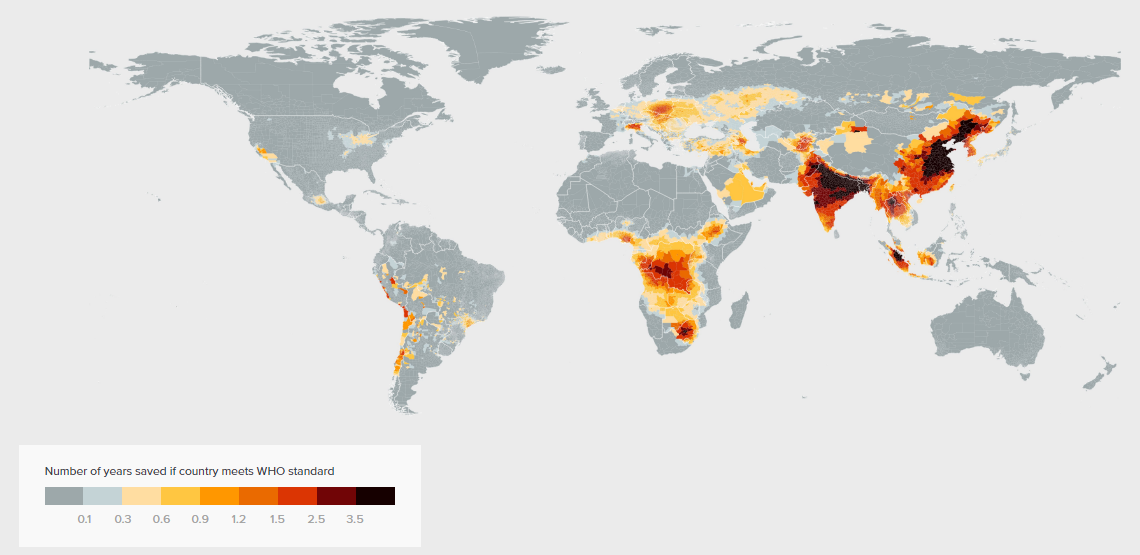This map shows how many years could be added to you life - if the air you breathe was less polluted

Living in China could shorten your lifespan by more than three years, as a result of air pollution.
Image: REUTERS/Jason Lee
Stay up to date:
Global Health
Air pollution is the single largest environmental health risk humans face, according to the World Health Organization, but what does that mean for you? Researchers have put together a map based on new findings that show, depending on where you live, how many years of life that gritty air is stealing.
In China, the “airpocalypse” is shortening the Chinese lifespan by more than three years, while in India, air pollution can cut a person’s lifespan by four years on average (and nearly a decade for someone in the capital New Delhi). Things aren’t looking good for the US either, if you live in California.
In a peer-reviewed study, published on Sept. 11 in US-based Proceedings of the National Academy of Sciences journal, a global team of scientists from the US, Israel and China examined pollution data from 154 Chinese cities 1982 to 2012 and compared it with mortality data covering 78 million people from 2004 to 2012. They found a strong link between reduced life expectancy and air pollution, as measured by PM10, a form of particulate matter that can lodge deep in lungs and cause respiratory disease.

The scientists drew on the effects of China’s well-intentioned Huai River Policy, under which the government has since the 1950s provided free coal for indoor heating in winter to households in cities north of the Huai River, to gauge the impact of sustained exposure to air pollution. Because of the the policy, northern and southern Chinese cities have had quite different levels of particulate matter concentration over time, and the country’s restricted migration policies helped isolate the effects of this.
In the north, PM10 reached some five times the WHO recommended safe limit (20 micrograms per cubic meter of air, µg/m³). Compared to the south, the concentration in northern areas, which includes capital Beijing, was around 50% higher. Controlling for other life-reducing behaviors, such as smoking, researchers found that led to an average reduction in life expectancy of 3.1 years due to cardiorespiratory diseases, such as lung cancer.
The scientists concluded that life expectancy is reduced by about seven months with every additional 10µg/m³ of PM10 in the air. “The results greatly strengthen the case that long-term exposure to particulates air pollution causes substantial reductions in life expectancy,” said Michael Greenstone, an author of the paper and director of the Energy Policy Institute (EPIC) at the University of Chicago.
Using the metric, Greenstone and his colleagues at the institute developed the Air Quality-Life Index (AQLI), a tool that shows how much longer people in different countries would live if the local air quality met the WHO standard for another kind of fine particular matter, PM2.5, viewed as even more hazardous, and now a global indicator for air pollution. (The researchers estimate that an additional increase of 10 μg/m3 of PM2.5 shortens lifespan of around one year, compared with seven months for PM10.)
According to the AQLI, even in developed countries like the US, increased PM 2.5 concentration levels are shortening lifespan in New York by one month and in Los Angeles by eight months. Pollution estimates for the AQLI will be updated annually, Greenstone told Quartz.
The new findings are in line with a study in 2013 that concluded that life expectancy was about 5.5 years lower (pdf) in the Chinese cities covered by the Huai River Policy, according to Avraham Ebenstein, an author of both studies and lecturer in the environmental economics department at the Hebrew University of Jerusalem. The reduced number of years lost in the newer study could be a sign of improving air quality, noted the researchers of the 2017 study. China has been investing heavily in renewable energy and switching out fossil fuels, including by subsidizing electric vehicles and punishing firms that violate air pollution laws.
Greenstone told Quartz via email that pollution may also “have affected people’s well being while they are alive in important ways that are not captured by the study,” such as through rates of sickness, or affecting education and earnings as an adult.
Don't miss any update on this topic
Create a free account and access your personalized content collection with our latest publications and analyses.
License and Republishing
World Economic Forum articles may be republished in accordance with the Creative Commons Attribution-NonCommercial-NoDerivatives 4.0 International Public License, and in accordance with our Terms of Use.
The views expressed in this article are those of the author alone and not the World Economic Forum.
Forum Stories newsletter
Bringing you weekly curated insights and analysis on the global issues that matter.
More on Health and Healthcare SystemsSee all
Alexandros Pantalis and Ithri Benamara
June 25, 2025
Ajit Singh and Nicole Cowell
June 24, 2025
Liu Ling
June 24, 2025
Alex Wiltschko
June 23, 2025
Shyam Bishen
June 20, 2025
Mamta Murthi and Sania Nishtar
June 19, 2025





